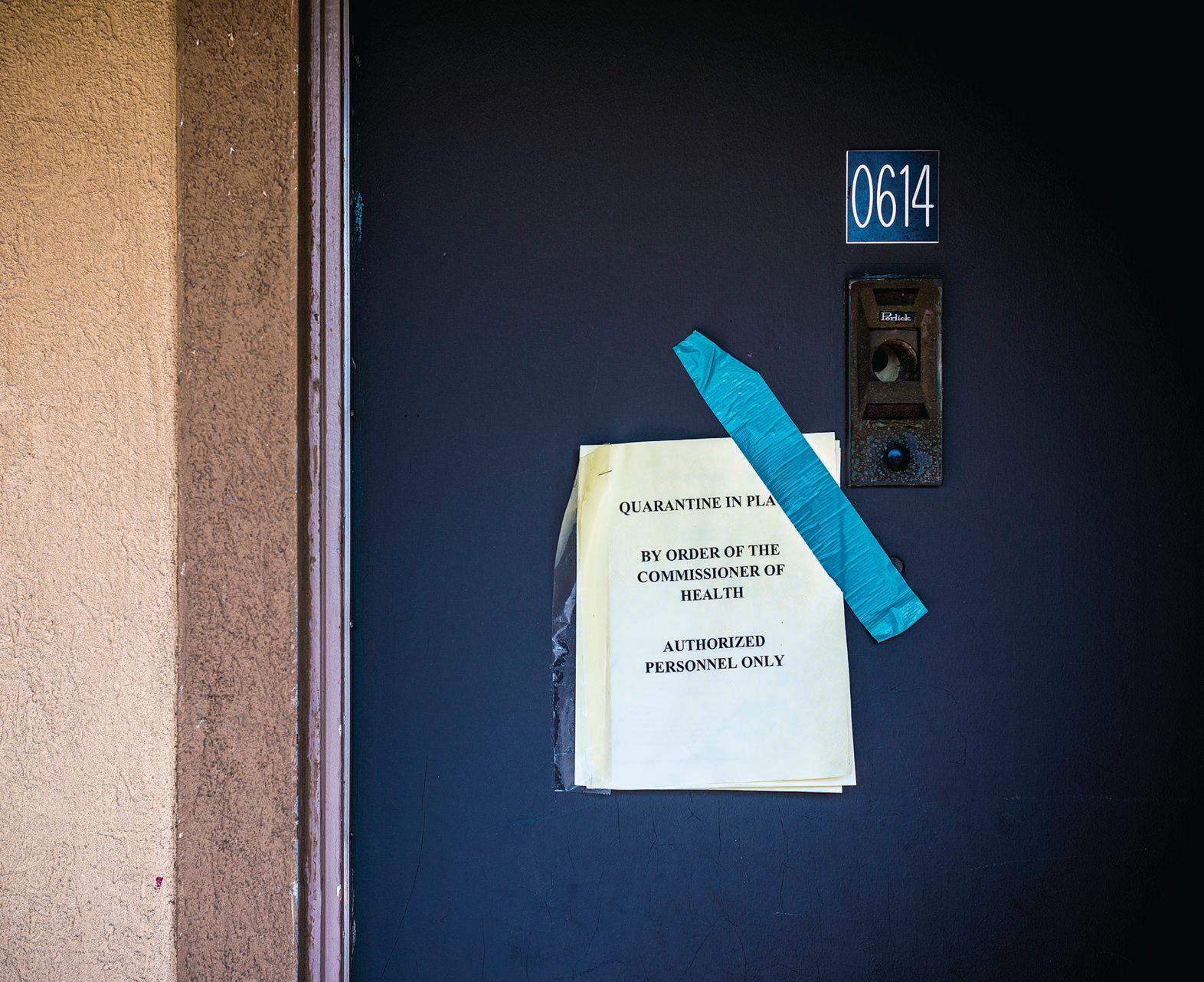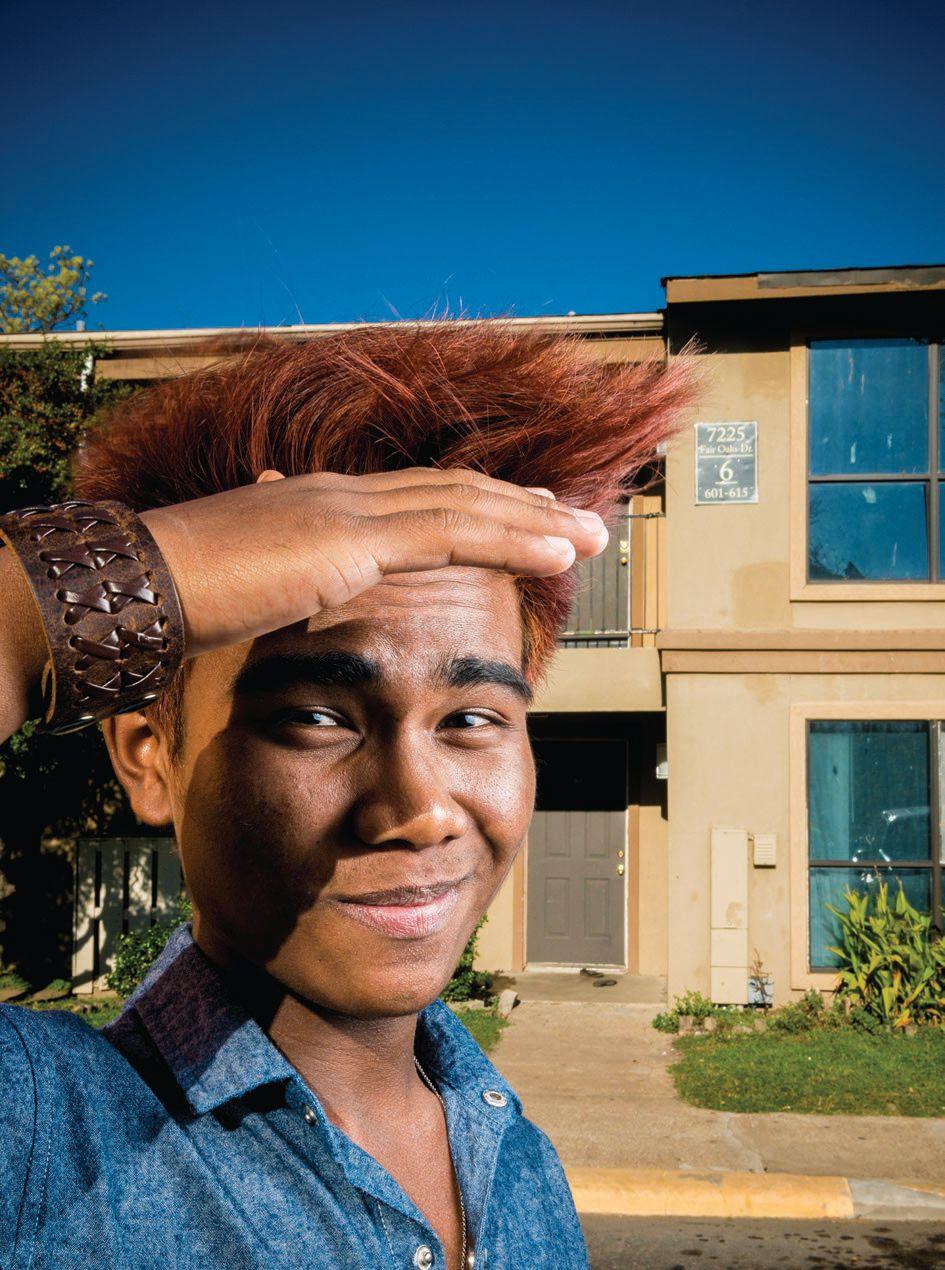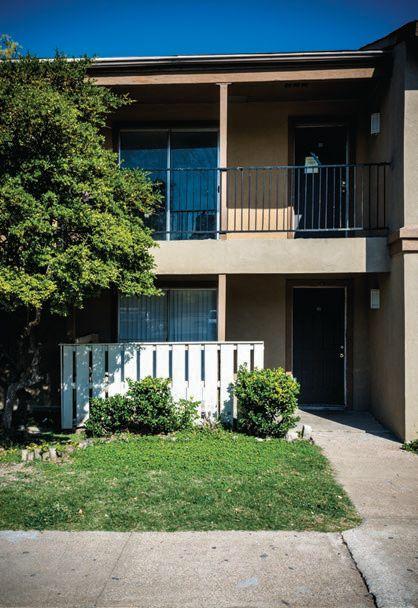
5 minute read
FIVE DAYS OF FRENZY
How Vickery Meadow dealt with its high-profile Ebola case and out-of-control media
Afew hours into the apartment 614 quarantine, the media maelstrom approached fever pitch.
They arrived in droves, even before police and health department officials showed up, say witnesses to the press’ descent on The Ivy Apartments in Vickery Meadow.
“The local guys, for the most part, were fine, but the national guys were horrendous,” says Rebecca Range, the executive director of the Vickery Meadow Improvement District.
They climbed fences, photographed crying women and children, and demanded answers from residents who did not understand what they were asking, Range says.
“It’s a big property — we had it closed off right away, but they were finding different ways in. You have to remember that most of the people at The Ivy don’t speak English. Eight different languages are spoken there. So you can imagine the chaos.”
Conrad High School student Se Da Oo Shay is fluent in “three and a half” languages and says he knows just about everyone at The
Ivy. He spent that first afternoon, Sept. 28, doing everything he could think of to explain the situation, as it unfolded, to his neighbors.
“They all asked me, ‘What happened? What happened?’” he recalls. Over hammering helicopters and chattering reporters, he told them: “I said, ‘Ebola happened.’ ”

The Ivy residents call him Shay. They come to him with their problems.

“They have a broken faucet, they don’t tell the office. They tell me,” he says.
When Shay arrived home from school to police blockades, news vans and cameras, he hurried to the apartment manager’s office.
“I asked what’s going on, and they told me that Ebola was at The Ivy, and I was thinking, ‘What is Ebola?’ I Googled it,” he says. “At first I was very scared, and I worried that this would be someone I know, but then I learned it was a guy, Eric Duncan, who I did not know. And I could breathe.”
Duncan, the first person ever diagnosed with Ebola in the United States, reportedly traveled from Liberia to Dallas to marry Louise Troh, occupant of Ivy apartment 614.
The details are familiar by now: Duncan went to Presbyterian Hospital Sept. 25 but was soon discharged. Three days later, when he was violently ill, an ambulance transported him back to the hospital, where he tested positive for Ebola, an infectious virus that has killed more than 4,000 and counting in Africa. Duncan died eight days later.
Duncan’s diagnosis prompted a mandatory quarantine of Troh and three others inside Ivy unit 614.
Hoping to catch a glimpse of Troh and the others, hundreds of reporters armed with mics, cameras and blinding spotlights stalked the apartment, day and night.
The Ivy residents’ inexperience with both the English language and American media made for a special kind of chaos.
One group of residents said they must torch the apartment; it was how they dealt with contaminated properties in their country, says

Shay. Others proposed vandalizing apartment 614 because they wanted the occupants and the media to leave.
This was the sort of irrational response Shay worked hard to prevent during the media siege, which lasted five days, until the quarantined were relocated.
“To an outsider it might have looked like the officials were really organized when it came to keeping people informed, but really it was Shay,” Range says, only halfway kidding.
Shay spent the better part of his life in a refugee camp near a war-impacted region of Thailand, he says with no hint of self-pity.
On an average afternoon, the teenager is dressed stylishly in a crisp white button-down, dark jeans and flip flops. His hair is spiky, his wristwatch techy. In the span of an hour he is interrupted several times by residents who need his help — eventually he excuses himself to help two visibly upset Burmese-speaking women report a crime.
Since he moved to The Ivy, it has been like this, he says. Through a refugee resettlement program, he and his 14-year-old brother moved to Dallas a few years ago to live with their grandparents. He speaks English, Burmese, Karen and some Thai. Of his own volition, he teaches English to anyone in the complex who wants to learn. Five nights a week, more than 30 people gather, sitting on the floor of a tiny apartment. He does his own homework while they work through exercises he’s given them.
“Without him, we are blind,” remarks one resident.
So when “Ebola happened,” as Shay puts it, he was thrust into the middle of the frantic effort to relay information to those surrounding the affected apartment.
As representatives from Dallas County, the City of Dallas, Dallas Police, the Center for Disease Control and Hazardous Materials steadily joined the effort, there were two major goals: stop potential spread of the Ebola virus and prevent panic. Both relied heavily on good communication, explains Stacey Roth, the public safety coordinator for Vickery Meadow Improvement District. At The Ivy, where so many languages are spoken, communication was problematic.
That’s where Shay would prove invaluable.
“We thought he worked for The Ivy at first,” Roth says. “This kid. He was talking to everyone. Answering their questions. Handing out literature about Ebola. Speaking calmly to people who were upset.” in their own language, even if they knew English,” he says.
Like Shay, most of The Ivy residents — especially those from Asia, where Ebola is not a problem — did not know what Ebola meant.
They didn’t even fully understand the concept of a virus, Roth notes.
That first afternoon, after repeating the same information so many times, Shay sat down for about an hour with pen and paper and translated vital information about Ebola into Burmese.
He took the translation to The Ivy’s office and made 100 copies, which he distributed to the Burmese residents.
Range says reporters were increasingly aggressive. She describes some walking into homes without knocking or barely knocking. Many of the residents do not lock their doors so family and friends can come and go, she explains.
One national news reporter barricaded herself in an elderly man’s apartment,
Range says. The man was distraught when he reported the situation to the apartment manager, using Shay to translate. The reporter refused to open the door for the manager or Vickery Meadow security officers. Roth and the Dallas police finally went to the door and told her that if she didn’t leave, they would tell the rest of the media that her station had locked a 60-something year-old man out of his apartment. A loud
This was before the CDC delivered the same information in Spanish and English, and 14 days before other agencies offered to help translate important information, Range notes.
Later, a Dallas ISD translator helped interpret incoming information, but the initial, urgent translation came from Shay.
Shay says his school allowed him a day off to help with communication at The Ivy.
He walked door-to-door with police, city and county officials, and VMID and CDC representatives, translating.
Shay interpreted for a British reporter early on, he says, but the lady they were trying to interview, 614’s next-door neighbor, reacted angrily. “She yelled, ‘Get out of my house!’ ” Shay says. Another woman threw rice at a reporter, Shay says. Shay, too, grew agitated with the media.
“They were stopping us on the way to school, making us late, trying to talk to little kids. The kids got smart and just responded argument ensued, Range says, but the reporter finally relented.
“Well, the residents at that point were not worried about Ebola,” she says. “They were worried about the media.”
And the fallout continued.
Several children who reportedly had been in contact with Duncan were pulled from school for observation. Some students from Vickery Meadow reported classmates picking on them.
Residents of The Ivy were told to stay home from work in some cases.
The VMID brought in an attorney to meet with residents who had been denied a right to work because of the Ebola scare.
Some of the hundreds of volunteers who work in Vickery Meadow stopped coming in, and the National Night Out block party and parade was canceled.









